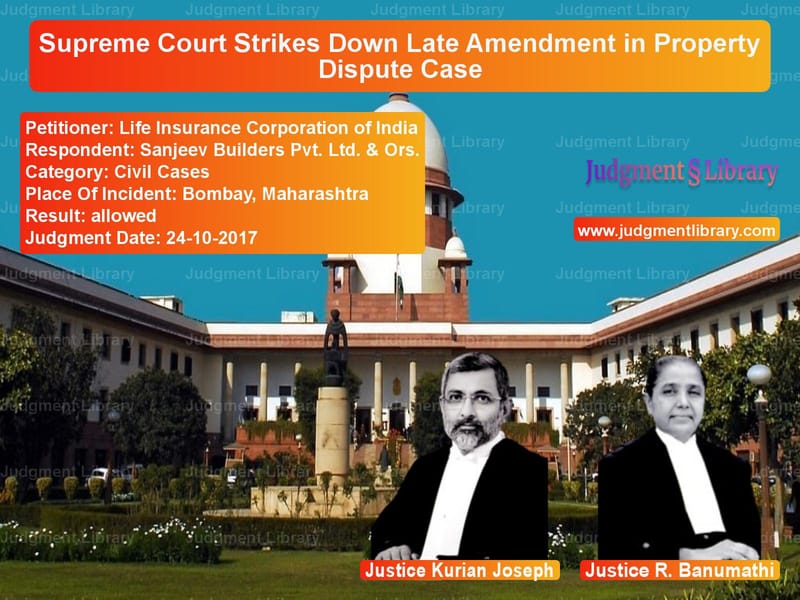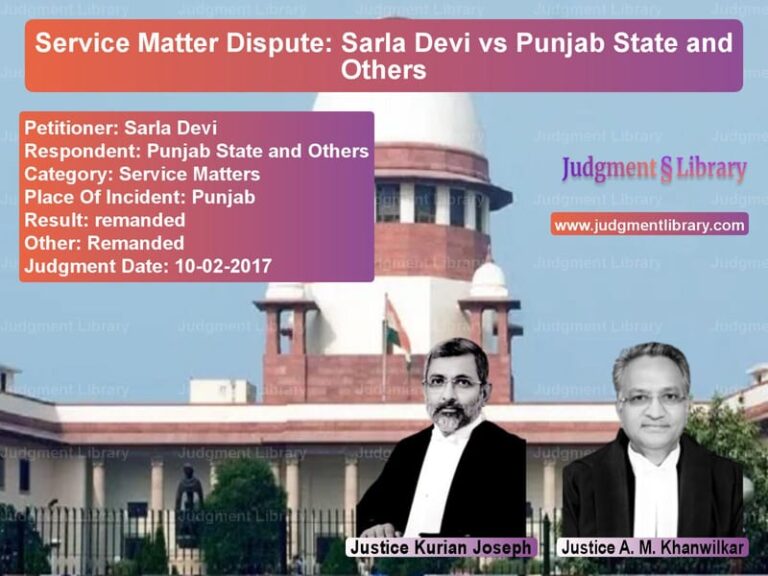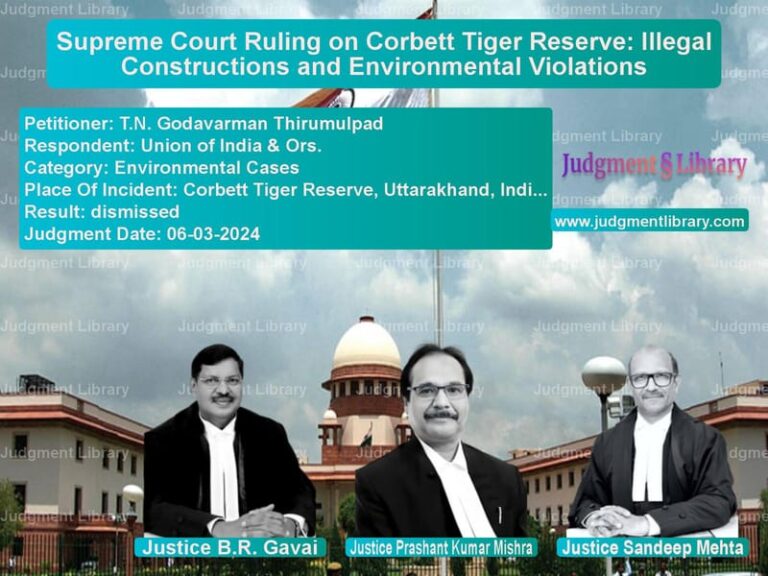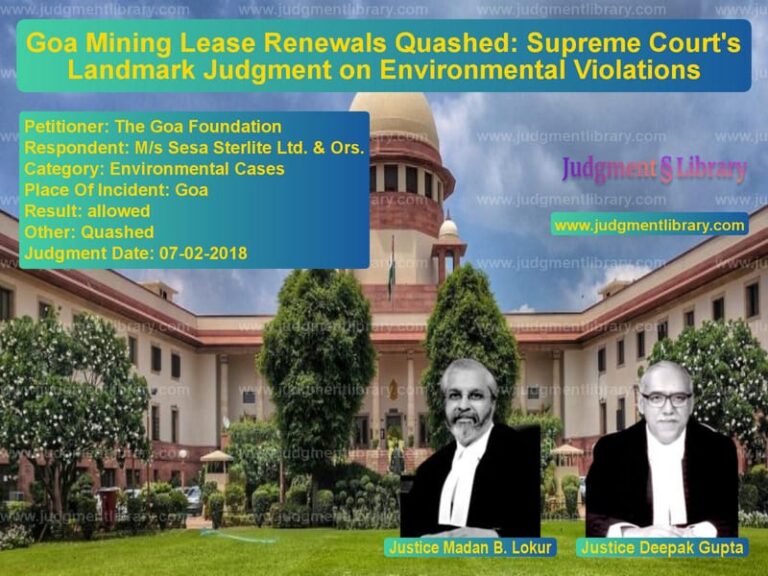Supreme Court Strikes Down Late Amendment in Property Dispute Case
The Supreme Court of India, in the case of Life Insurance Corporation of India vs. Sanjeev Builders Pvt. Ltd. & Ors., delivered a landmark judgment on October 24, 2017, addressing the long-pending property dispute and the issue of amending pleadings decades after a suit was filed. The Court ruled that allowing an amendment after 27 years of litigation would cause serious prejudice to the opposing party, setting an important precedent on procedural fairness in civil cases.
The case revolved around a suit for specific performance filed in 1986 against Life Insurance Corporation of India (LIC) by Sanjeev Builders Pvt. Ltd. The dispute arose from an agreement to sell a property on June 8, 1979, which LIC later rescinded on November 28, 1984. In 2014, a third-party company, Kedia Construction Company Ltd., sought to be impleaded as Plaintiff No. 3, claiming to have acquired rights in the property through an agreement dated August 24, 1987. LIC opposed this amendment, arguing that it was an abuse of legal provisions.
Petitioner’s Arguments
The petitioner, Life Insurance Corporation of India (LIC), contended that:
- The impleadment application was filed 27 years after the original suit and was unjustifiably delayed.
- The original agreement itself was terminated in 1984, and no rights could be transferred by the original plaintiffs.
- The amendment would deprive LIC of its substantive rights to challenge the validity of the agreement.
- The long delay in seeking impleadment demonstrated a lack of bona fides and was an abuse of legal process.
- The Chamber Summons allowing the amendment should be set aside to prevent unnecessary prolongation of the litigation.
Respondent’s Arguments
The respondents, Sanjeev Builders Pvt. Ltd. & Ors., argued that:
- The application for impleadment was necessary as the rights of Plaintiff No. 3 (Kedia Construction Company Ltd.) had arisen during the litigation.
- Under Order XXII Rule 10 of the Civil Procedure Code (CPC), the assignment of contractual rights during the pendency of a suit is permitted.
- Allowing the amendment would not cause prejudice to LIC, as the dispute could be adjudicated upon at trial.
- The delay in seeking impleadment was justified due to procedural complexities and the prolonged nature of the litigation.
Key Observations by the Court
The Supreme Court ruled in favor of LIC, emphasizing the importance of procedural discipline in civil litigation. The bench observed:
“Allowing an amendment after 27 years of litigation seriously prejudices the rights of the defendant. Procedural fairness requires that applications for amendment must be filed within a reasonable time.”
The Court further noted:
- Order XXII Rule 10 CPC permits assignment of contractual rights but requires timely application for impleadment.
- The original plaintiffs could not transfer rights that they no longer possessed after LIC had rescinded the agreement.
- The delay in filing the application was unexplained and unjustified, making the amendment legally untenable.
- Litigation should not be prolonged indefinitely by allowing new parties to be added decades after a suit has been filed.
Final Judgment
The Supreme Court ruled:
“The impugned judgment is set aside, and the appeal is allowed. Chamber Summons No. 187 of 2014 in Suit No. 894 of 1986 stands dismissed.”
The Court also clarified:
“A procedural provision should not be used in a manner that negates substantive rights. Long delays in seeking amendments cannot be condoned as a matter of routine.”
Implications of the Judgment
This ruling has several significant implications:
- It reinforces the principle that amendments to pleadings should be sought within a reasonable timeframe.
- It protects defendants from facing prolonged litigation due to delayed impleadment applications.
- It upholds the importance of procedural discipline in civil disputes.
- It ensures that parties cannot use legal provisions to override substantive rights unfairly.
- It establishes that contractual rights cannot be assigned once the original contract has been legally terminated.
Conclusion
The Supreme Court’s ruling in this case provides much-needed clarity on amendments in civil suits. By striking down the late impleadment, the judgment ensures fairness and efficiency in civil litigation. This decision will serve as a precedent in property disputes and contractual cases where amendments are sought after significant delays.
Going forward, this judgment will guide lower courts in handling applications under Order XXII Rule 10 CPC, ensuring that amendments are allowed only when they are timely and justified.
Don’t miss out on the full details! Download the complete judgment in PDF format below and gain valuable insights instantly!
Download Judgment: Life Insurance Corpo vs Sanjeev Builders Pvt Supreme Court of India Judgment Dated 24-10-2017.pdf
Direct Downlaod Judgment: Direct downlaod this Judgment
See all petitions in Property Disputes
See all petitions in Specific Performance
See all petitions in Contract Disputes
See all petitions in Judgment by Kurian Joseph
See all petitions in Judgment by R. Banumathi
See all petitions in allowed
See all petitions in supreme court of India judgments October 2017
See all petitions in 2017 judgments
See all posts in Civil Cases Category
See all allowed petitions in Civil Cases Category
See all Dismissed petitions in Civil Cases Category
See all partially allowed petitions in Civil Cases Category







